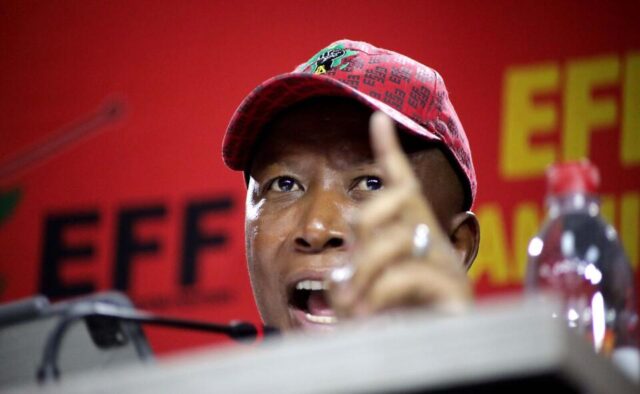EFF leader Julius Malema has slammed President Cyril Ramaphosa for his ‘man-made’ load shedding, questioning how the lights were able to stay on throughout the Rugby World Cup, but power cuts resumed as soon as captain Siya Kolisi lifted the Webb Ellis Cup.
ECONOMIC Freedom Fighters (EFF) leader Julius Malema has slammed President Cyril Ramaphosa for his “man-made” load shedding, questioning how the lights were able to stay on throughout the Rugby World Cup, but power cuts resumed as soon as Boks captain Siya Kolisi lifted the Webb Ellis Cup in Paris.
Malema has described the load shedding situation as madness, questioning the country’s priorities as the power cuts return just as matric pupils begin their crucial final year exams.
“I will end this load shedding in less than no time because when there is World Cup there is no load shedding, when our children write matric exams there is load shedding,” said Malema during a wide ranging interview with Faith Mangope on Metro FM Talk on Tuesday night.
“Have you ever seen such madness where we switch on (the lights) to watch rugby, but we switch off (the lights) when our children write exams,” he said.
“Have you ever seen such madness in your life? What type of load shedding are we dealing with that has eyes and ears, it knows Kolisi must pick up the ball it doesn’t go.”
In an update on Sunday, Eskom said there had been nine days of “good generation performance and no load shedding”, but announced Stage 2 load shedding into Monday and Stage 3 load shedding from Tuesday.
It said it needed to “replenish emergency reserves ahead of the anticipated cold weather that will increase the demand for electricity over the next few days” and said there were breakdowns currently at 16,150MW of generating capacity while the capacity out of service for planned maintenance was 5,950MW.
A unit each at the Duvha, Groovlei, Kusile and Matimba power stations went offline for repairs.
Before load shedding returned on Sunday, the country had last had Stage 1 load shedding on Wednesday, October 18.
At the start of the World Cup at the beginning of September, the country experienced up to Stage 5 and 6 load shedding until the situation went to no load shedding around mid-September. Levels remained low until mid-October.
Orchestrated
Malema accused Ramaphosa of orchestrating the load shedding crisis to empower independent power producers (IPPs).
“The biggest problem at the centre of what we are dealing with is the maintenance of the power stations, there is nothing magical that Brian Molefe or Matshela Koko did, they just maintained the power stations,” he said.
In his address to the nation on Monday night, Ramaphosa said progress was being made towards ending load shedding.
“Our greatest priority has been to reduce the severity and frequency of load shedding to achieve energy security. Over the last few months, there has been a measurable decline in the severity of load shedding.
“The Energy Action Plan that I announced in July last year is showing positive results, giving us greater confidence that we will bring load shedding to an end,” he said.
He said 12,000MW in private investment in electricity has been confirmed, with 4,500MW being produced by those with rooftop solar as well.
In August, former president Thabo Mbeki was also scathing about the load shedding situation in South Africa, saying it was deliberate during a dialogue hosted by the Thabo Mbeki School of Public and International Relations at the University of South Africa in Pretoria. He also had choice words of praise for Molefe.
Mbeki said he believed there was a systematic attempt to collapse Eskom, leading to rampant and “deliberate” load shedding in the country.
He said the systematic collapse of key institutions had set in since about 2008, which was around the time he was booted out of government after a bruising defeat to Jacob Zuma at the 2007 ANC Polokwane Conference.
“There’s a whole process which takes place in this country which still we don’t understand, of a systematic process to ensure that the democratic republic does not succeed; that’s one of the things necessary for us to understand.
“None of the negative things that happened, none of them, are accidental. There is greed, there is corruption, but at the base of it is to make sure that we fail.
“It is a matter of strategic importance to understand what went wrong because there were deliberate processes put in by some people to make sure we fail,” he said.
IOL News







